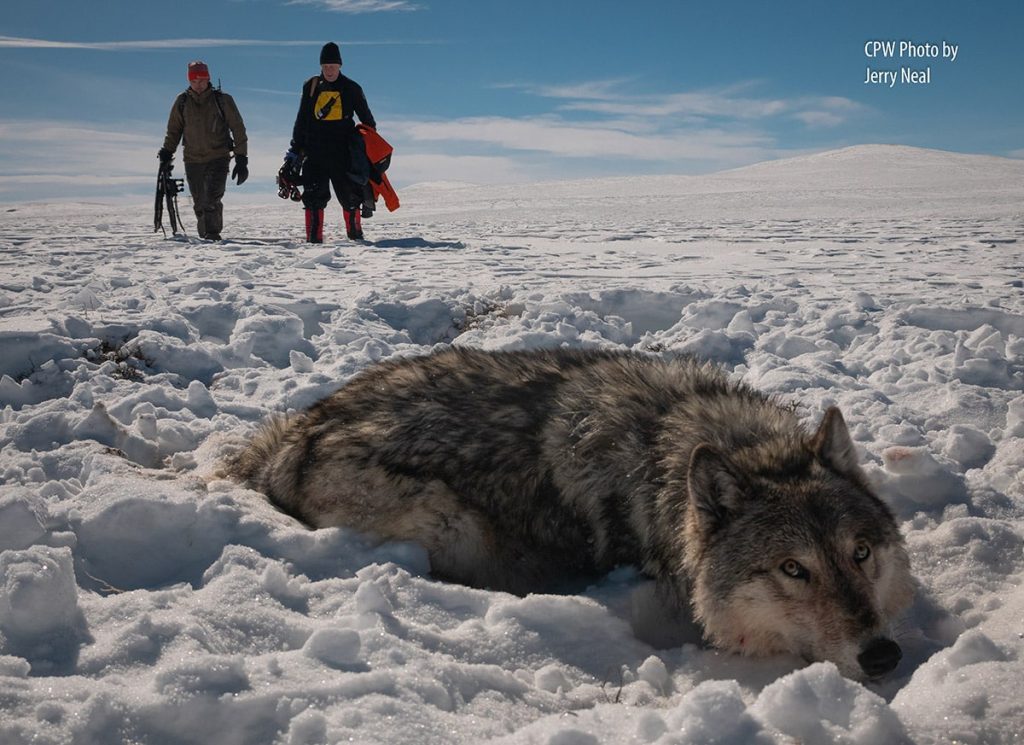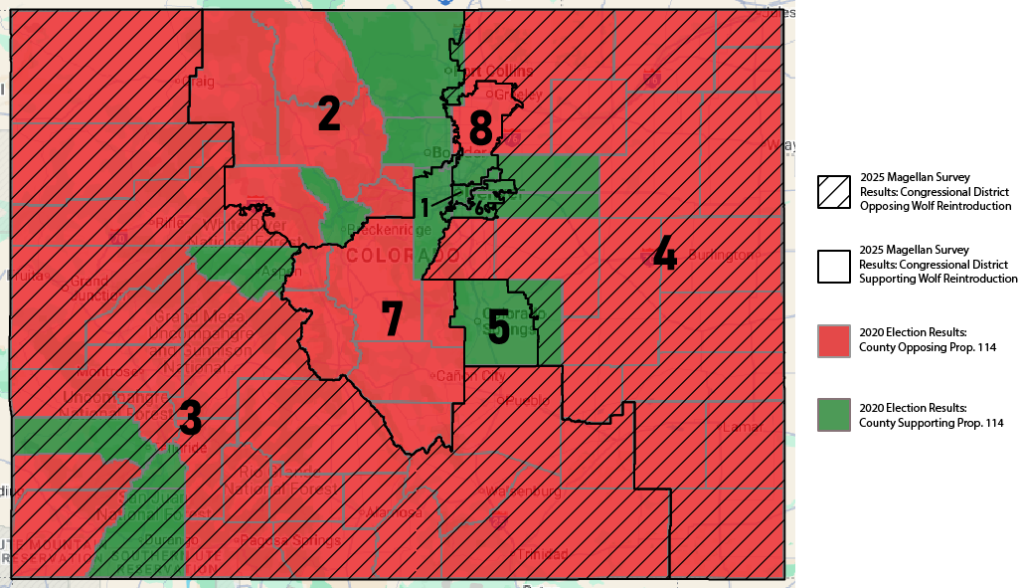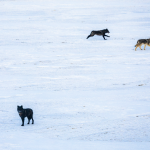Opposition to Colorado’s wolf reintroduction remains strongest on Western Slope
Voter opinions remain unchanged two years into the state’s wolf reintroduction in a 2025 survey

Jerry Neal/Colorado Parks and Wildlife
Colorado voters’ opinions on wolf reintroduction in the state haven’t changed much since the effort was narrowly approved in a 2020 ballot measure, according to the results of a 2025 voter opinion survey.
A new survey from Magellan Strategies, a conservative-leaning political research firm, found that just over half of voters (53%) support reintroducing wolves in Colorado. This included 27% who strongly support the effort and 26% who somewhat support it. Thirty-seven percent of those surveyed opposed wolf reintroduction — 23% strongly and 14% somewhat — and 10% had no opinion.
In 2020, the ballot measure that required Colorado Parks and Wildlife to reintroduce wolves passed with 50.91% of the vote.
The wolf reintroduction questions were part of a larger 2025 voter opinion survey conducted by Magellan Strategies, which surveyed 1,136 registered Colorado voters between July 30 and Aug. 12, 2025. The results were weighted to represent Colorado’s registered voter population demographics.
The survey reported a 2.91% margin of error, which could sway the reported statewide support for wolf reintroduction from just above 50% to nearly 56%.
Opposition to the wolf reintroduction remains the highest on the Western Slope and the Eastern Plains, where the vast majority of counties — with a few exceptions — opposed the 2020 ballot measure.
The wolf reintroduction measure, which required the wolves to be released west of the Continental Divide, was struck down in the majority of Colorado’s 64 counties.
Only 13 counties — San Miguel, San Juan, La Plata, Pitkin, Summit, El Paso, Denver, Boulder, Larimer, Jefferson, Broomfield, Adams and Arapahoe — approved the wolf reintroduction during the November 2020 election.
While the 2025 survey from Magellan did not break down its data geographically by county, it did separate the results by Colorado’s congressional districts. The margin of error for the congressional district results is more significant than that of the statewide results, with Magellan stating the margin is between 8% and 8.8%.

In the survey, only two congressional districts showed majority opposition to the wolf program.
Congressional District 3 — which includes most of the Western Slope and some southern counties such as Pueblo County, and is represented by Republican Rep. Jeff Hurd — reported 53% opposition and 40% support. Congressional District 4, which spans eastern Colorado and is represented by Republican Rep. Lauren Boebert, reported 56% opposition and 38% support.
In the other six congressional districts, support outweighed the opposition. This was less pronounced in Congressional District 8, where 44% expressed support and 41% opposed it, and the 8% margin of error could put the results in either direction. This district spans a segment of Colorado’s northern Front Range, including Greeley and Thornton, and is represented by Republican Rep. Gabe Evans.
Support for wolf reintroduction was much higher among Coloradans who identified as Democrats and voted for Kamala Harris in the 2024 presidential election. The survey reported that 71% of Harris voters support the wolf reintroduction compared to only 29% of those who voted for President Donald Trump.
The survey also indicated that support of the wolf program was slightly higher among younger voters. Those surveyed between the ages of 18 and 44 reported 59% support compared to 45% of those 45-64, and 50% of those over the age of 65. More of those in the middle age bracket, 10%, indicated indifference. For those 45-64, as well as those 65 and older, 45% reported opposing the reintroduction effort.
Opinions on the wolf reintroduction varied less based on gender, income and education in the 2025 survey.
The survey also asked how informed voters were about Colorado’s wolf reintroduction. Thirty-two percent reported being very informed, 59% somewhat informed, 6% not informed at all, and 3% reported having no opinion.
The 2020 ballot measure required that Colorado create a self-sustaining population of gray wolves, with the first animals hitting the ground by Dec. 31, 2023. Parks and Wildlife released the first 10 wolves in Grand and Summit counties in December 2023, followed by the release of 15 more in Pitkin and Eagle counties in January 2025. The agency is reportedly releasing a third group of wolves this winter in southwest Colorado.
The program has not been without its share of controversy, with impacted producers in northwest Colorado claiming the state was not adequately prepared to reintroduce wolves and lawmakers questioning the cost of the program. However, environmentalists and wolf advocates have applauded its successes, including the formation of four wolf packs and programs to promote non-lethal tools to reduce conflict between the wolves and livestock.
City of Aspen supports parking cost increase
Aspen City Council supported increasing city parking fees next year to help support public transportation costs, fund an increased demand for parking services, and reduce congestion.










